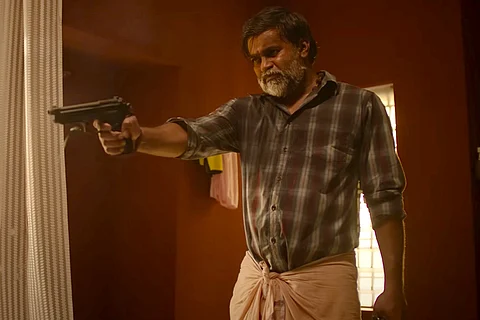

There was a time when Tamil cinema made one film after another about the wonders of organic farming. It wasn’t a good phase for a reviewer who had to sit through this week after week, listening to lectures about the glories of manure and the redness of traditional tomatoes. But one almost feels nostalgic for those days because the trend was replaced by the 2019 Pollachi sexual assault case, and we’re still seeing films inspired by it, four years later.
It is no secret that director Mohan G is fond of conspiracy theories. His ideas can be boiled down to two beliefs that are fundamental to his films: women are stupid and need to be protected always; the toxic masculinity of dominant caste men who ‘own’ these women is the answer to all their problems. Bakasuran is no different, and the film opens with a brutal murder executed by its protagonist Rajasekhar (Selvaraghavan), also known as Bheemarasu or Rasu.
A lecherous man asks a woman to strip before him in an isolated shed. Rasu follows them, rescues the woman, and kills the man, tearing him into two. We’re told exactly which organs of the body are involved, and now you know why I miss organic farming. Selvaraghavan is chilling as a Shiva bhakt who moonlights as a killer – beating, punching, kicking, stabbing, slitting, shooting, and performing other such acts of violence with cold-hearted precision. As he goes on his hunt, there is a retired army man turned ‘crime YouTuber’ who becomes curious about his crimes – Major Arul Varman (Nataraja Subramanian), whose niece dies by suicide in mysterious circumstances.
The story unfolds in Salem and Cuddalore, taking us through a sex work racket that traps naive young women. Varman’s niece, we learn, was lured into the racket by her dark-skinned boyfriend. The central premise of Draupathi (2020), Mohan G’s earlier film, was a version of ‘love jihad’ – the conspiracy theory was that men from oppressed castes deliberately court women from dominant castes in a bid to improve their own fortunes. It isn’t real love but ‘naadaga kadhal’, the director claimed. Bakasuran isn’t quite as blatant as Draupathi, but the messaging is clear as day – young women from ‘good’ families who have ambitions other than an arranged marriage will fall into bottomless hellholes. There are cameras recording all their actions all the time, and at any moment, a video will drop and destroy their lives forever. They’re all in The Truman Show, except it isn’t a comedy.
In one scene, Rasu’s daughter tells him that she wants to go to Chennai, Pondicherry, or Perambalur to do her post-graduation. “Don’t go to Chennai or Pondicherry, the people there have become like white people,” Rasu says. What does “like white people” mean? Does it mean a belief in freedom of choice? If so, how terrible indeed! Rasu’s father is presented as a more open-minded man, but considering the script justifies Rasu’s paranoia, it’s difficult to see it as a balancing act.
Ironically, for someone SO concerned about women and their bodies, Mohan G isn’t above including an item song. It’s okay to objectify women for the ‘noble’ cause of message padam cinema, it appears. Even more ironically, Radha Ravi – who was accused of sexual harassment during the #MeToo movement – plays a figure of authority who sexually harasses young women in the film. Wink-wink joke? I don’t think so.
There are only two women in this cautionary tale who aren’t victims of sex rackets. One is Devadarshini who plays a police officer and duly disappears after elevating Varman’s prowess as an investigator. The other is Sundari (Sasilaya) who runs a brothel and wears a sleeveless blouse to prove her immorality. Needless to say, she doesn’t walk into a happy sunset.
The background score is unbearably loud, and the screenplay is an endless series of all the things that can happen to a “pombala pulla” and how nobody can do anything about it because it involves a “pombala pulla”. The last nail on the coffin though is the film’s conviction that the reason for all this violence against women is…the smartphone! Mohan G didn’t invent the idea – khap panchayats have previously banned women from using smartphones because it allegedly leads them “astray”. It’s just surprising that after taking us through all the difficulties faced by a “pombala pulla” and Rasu tearing people into pieces in vengeance, the smartphone is identified as the villain. As if sexual assault and victim shaming didn’t exist before its time.
Cyber harassment is a serious issue, but it isn’t a new crime. It is a new manifestation of an old crime, an old crime that exists because of toxic masculinity, the very thing that the film celebrates. It exists because of the inordinate importance given to women’s ‘honour’ and the policing of their bodies and choices by families and society at large. Bakasuran isn’t interested in examining the root of the issue because it is busy harvesting it.
Even setting aside all its problematic theorising, Bakasuran fails as a thriller because it has nothing new to offer. We’ve seen similar storylines over and over again, and the film ends up being quite a bore. Bakwaasuran (nonsense-suran), is more like it.
Sowmya Rajendran writes on gender, culture, and cinema. She has written over 25 books, including a nonfiction book on gender for adolescents. She was awarded the Sahitya Akademi’s Bal Sahitya Puraskar for her novel Mayil Will Not Be Quiet in 2015.
Disclaimer: This review was not paid for or commissioned by anyone associated with the film. Neither TNM nor any of its reviewers have any sort of business relationship with the film’s producers or any other members of its cast and crew.